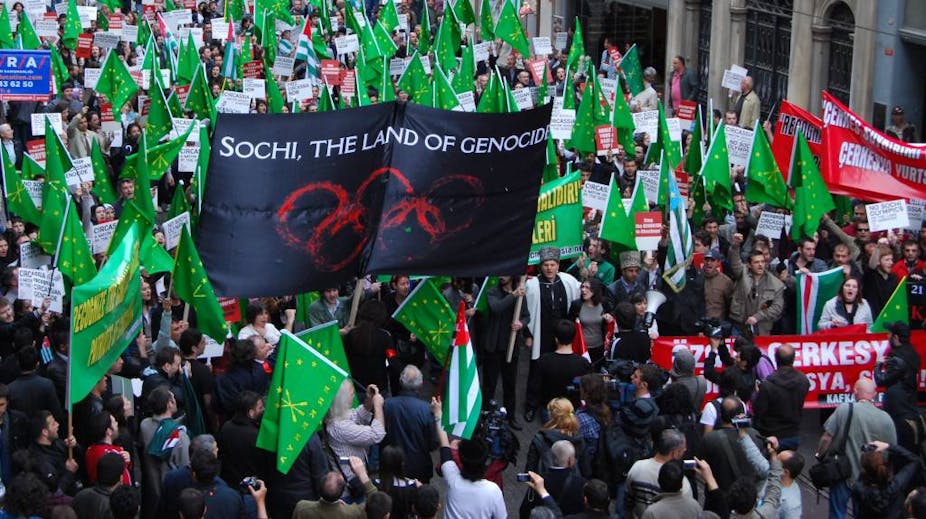The Sochi Olympics shines a spotlight on the forgotten history of the Caucasus, but one group of people has not made news headlines in the same way as neighbouring Chechnya or Dagestan. The Circassian people are natives of Sochi and the surrounding area that has been transformed for the Winter Games. Their world has evolved through a series of tragic events, including genocide, exile and territorial division.
The Circassians suffered defeat at the hands of the Imperial Russian military 150 years ago. Many were killed and even more deported. Then, during Soviet times their land was divided during Stalin’s experiment with nationalities and Circassians were grouped together with other ethnic groups not related to them. Today, less than 10% of the Circassian population remains on its native soil in the Caucasus.
The Circassian question
The Sochi Olympics touch a nerve among Circassians for several reasons. By an irony of history, the 2014 Olympic Games will mark the 150th anniversary of the Circassian defeat at the hands of Russia. After more than a century of fighting, hundreds of thousands of Circassians were killed by imperial forces. The memory of this defeat is kept keenly alive in the Circassian community. Every year on 21 May, Circassians around the world light 101 candles and observe a minute of silence in memory of the 101-year war.
Sochi itself was the site of the war’s last battles and its port was the place from which the Circassians were deported to the Ottoman Empire. Krasnaya Polyana, the area that will be the centre of the 2014 Olympic Games skiing events, marked the spot on 21 May 1864 where a parade of Russian troops celebrated the end of the war. Sochi itself was named after the Circassian ethnic group Shache, which lived there until 1864. It was also the last capital of independent Circassia.
More critical Circassian activists demand that the Sochi Olympics be completely cancelled. On 4 October 2007, several Circassian organisations in the US appealed to Russian President Vladimir Putin to cancel the Sochi Olympics and recognize the Circassian Genocide. They are still waiting for a response.
Anti-Kremlin Circassian activists launched the “No Sochi 2014 Campaign” in 2007. Since Russia was awarded the games, Circassians in the US and Turkey have demonstrated in front of the Russian consulates in New York and Istanbul demanding their cancellation. Their message to the world is, “If you let the 2014 games go on as planned in Russia, you’ll be skiing on the graves of our oppressed ancestors.”
At the very least, most Circassians want elements of their culture to be included in the Olympics and support the games on that condition. Those in Russia have organised many appeals to the organisers to include Circassian elements in the games. The Parliament of Adygeia spoke out in March 2010 with unusual criticism of Russian federal policy. They declared:
To our great sorrow the state and civil structures completely ignore the history and culture of the Circassians, the indigenous people of the Black Sea shore. The Circassian element was completely ignored during the solemn transition of the Olympic Fire from Vancouver to Sochi.
In response, the Russian Olympic Committee agreed that Circassian elements should be included at Sochi. The promise was not kept.
Evolving tactics
Circassians inside and outside of Russia have been increasingly united since the fall of communism. As well as seeking recognition of the genocide that took place in 1864 at the hands of the tsarist military near Sochi, they want unification of Circassian republics within Russia and repatriation of the expelled population.
The Circassian national movement is constantly evolving in response to new challenges. While it is far from achieving its three strategic goals, it has made modest progress. The 1990s saw neighbouring local parliaments of Kabardino-Balkaria, Adygeia, and Abkhazia all recognise the Circassian genocide. Also, for the first time a foreign state, Georgia, recognized the Circassian genocide in 2011. However, the Russian state constantly denies it, leaving considerable work to be done.
Sochi is the scene of terrible crimes in Circassian history. This should not be forgotten as the fun and games of the Olympics unfold. Equally it is a chance for the Circassian community to come together and highlight their grievances to a world whose eyes are on region. Wandering for a long time, Circassians have remained relatively quiescent. But it’s possible that this period of quiet is coming to an end with Sochi providing cause to mobilise around Circassian history and identity.

